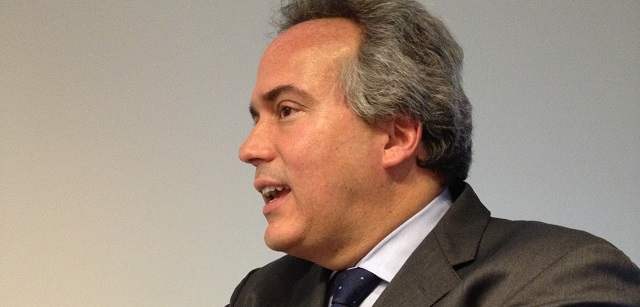First of all, disclosure question: do you have anything to do with candidate Capriles or is your family name a very common one in Venezuela?
We happened to be neighbors but we are not family. At least not close family; we may be very distant cousins, seven degrees of kinship or something like that.
Is there any key factor or economic data that journalists are skipping or dismissing these days when talking about Venezuela?
I believe we are going to have new data soon but they are still to be published by the Central Bank. There has been a strong halt in the economy, indeed. That is why multinationals are waiting, protecting their inventories, reducing their output and sales, because they don’t know what can happen to prices. This isn’t due to the political process or to the upcoming elections but to the enormous devaluation of the official exchange rate, that was usually used as a tool to have access to foreign currency. This has slowed down the economy and we will soon see big drops of the industrial activity around May, when the GDP data are published.
Is oil Venezuela’s economy doom, as some say?
Venezuela needs to admit being an oil country. It has the world’s largest proven oil reserves. And it should come up with a developing plan according to that, although allowing access to other products, of course. I don’t see oil as a curse; however, it is true that it can cause distortions and some politicians don’t always answer to the people’s will but use the power that oils gives to them.
What percentage of Venezuela’s economy is based on oil?
97% of exports are oil barrels. If we look at the nominal GDP, it’s 33%. That is to say, almost a third of our economy is based on it, but almost all exports and around 40% of the State’s income.
How has productivity evolved during Chávez government?
Negatively. The private sector has plummeted, we can see it very clearly in the oil sector: between 2005 and 2012 there has been a decrease of 600,000 barrels. That means 600,000 less barrels that you are producing with a company you have increased its debt at the same time. At the end of the day, it is more debt with less production.
What are the consequences of the capital flow control existing today in Venezuela?
I have no fear of any “corralito” in the making [frozen bank deposits like in Argentina 2001] in Venezuela, because we already have a “corralón” [a big bank deposits freeze]. The financial sector has been one of the big beneficiaries of the currency exchange control. That means commodities for the financial markets, which is money itself, are kept captive, not let out of the country. Then you have a big increase in liquidity or deposits in the financial sector, and those are managed to go to the State, mainly. We have a big increase in internal debt and deposits and the financial sector is getting much of its profit share brokering between both sectors.
Do you expect any change?
Not substantially. But the main thing is that an alternative way to access foreign currency must be developed, one that is fast, agile and that lets companies avoid the whole official approval process. That’s the most important change because it will address the distortion on relative prices and companies will be able to sell their products again.
In the last few years, China lent Venezuela 42,000 million dollars. Will Chavez’s dead change in any way the relations with Beijing?
China has come to be the main investor in Latin America and in Venezuela in particular. Today, China has overcome the United States. China is trying to secure its commodities. But with the change in Venezuela’s government, tensions are expanding a little bit with. From what I know, Chinese do not clearly understand the legitimacy of the process and to sign new agreements they prefer to wait to a legitimate president.
Briefly: best and worst of the Chavez’s Economy.
Economy-wise, it’s been pretty negative. All the region managed to reign on inflation, rebalance its fiscal house and manage to get into sustainable growth. Venezuela, on the other hand, did none of those. In addition, it has spoiled one of the best opportunities the country have had, because oil prices was at its minimum when he came to power in February 1999 (7 dollars), and last week was at 107. Economically its been a big waste. The social aspect could be the biggest legacy of Chávez. Any new government, whether left, center or right, radical or compromising, will have to keep putting poor in the center of the political discourse.
As well as the uncertainty, a lot of foreign investors keep interested in Venezuela. What are the remaining risks and what new opportunities open up?
In Venezuela there is a new big opportunity opening now. We have to wait and see the signals of the new government with the composition of its new cabinet, and also the transfer of assets from public to private sectors. Today they are the cheapest assets of all Latin America, and if it follows the example of Colombia, Peru or Brazil, they will triple or multiply by 10.






Be the first to comment on "“For Venezuela, being an oil country isn’t necessarily a curse”"